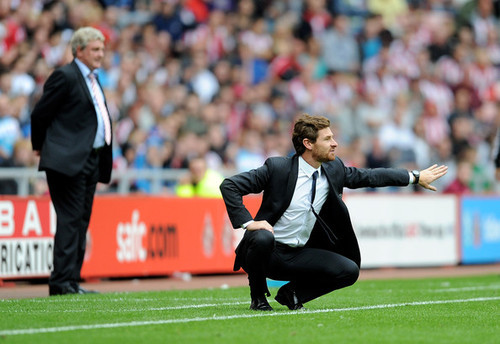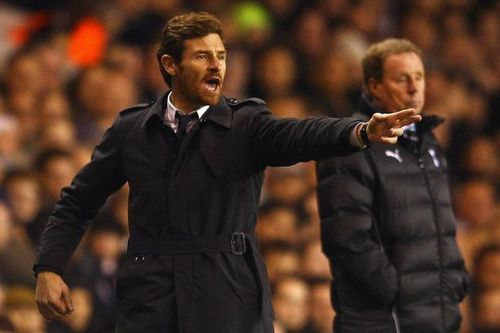Crouching Manager, Hidden Talent?
Crouching Manager, Hidden Talent?


By Tim Palmer
When Daniel Levy sacked Harry Redknapp in May, It would have been difficult to find a manager so contrastingly different from his predecessor than the one appointed, Andre Villas-Boas. The Portuguese is a young and enthusiastic prodigy who never played professionally, while Redknapp is a 64 year old veteran of the game, having played and then managed extensively across England (a three year spell in America aside) for the past forty-seven years.
Their approaches to football are enormously different. Villas-Boas is very much a system and strategies man, seeing football more like science than sport. In his upcoming biography, former Burnley chief executive Paul Fletcher has revealed Villas-Boas was in the frame to replace Owen Coyle after the latter departed to Bolton Wanderers in 2010: “there was some complicated stuff in it, with some things that I didn’t understand,” he wrote. “Would Burnley players have ever understood what he wanted if he’d told them to ‘solidificate’ or some of his other terms?”
By contrast, Redknapp preferred a remarkably open style of football. His football philosophy is neatly summed up by a declaration made in his column for The Sun last year: “You can argue about formations, tactics and systems forever, but to me football is fundamentally about the players. Whether it is 4-4-2, 4-2-3-1, 4-3-3, the numbers game is not the beautiful game in my opinion.“ More recently, Redknapp went out of his way to seemingly criticise Villas-Boas’ highly meticulous approach to coaching: “These days you’re getting 70-page dossiers on this and that,’ he said. ‘Bulls**t can baffle brains at times.’
Villas-Boas has certainly been responsible for some brain-baffling decisions during his time in England, but his response after Tottenham’s first win of the season away to Reading was calm and measured. His response? “I am not sure if Harry was mentioning that about Jose Mourinho but, if he is, I find it strange. He is not referring to me because I don’t use those situations. In the end, independent of the manager being modern or being old-fashioned or old school or looking towards the future, it doesn’t matter.”
The progression from Redknapp’s perceived ‘old school’ to Villas-Boas ‘modernity’ has been the mantra at Spurs all summer. The Tottenham squad the Portuguese took over, although it was better suited to his preferred high octane style of football than the Chelsea team he inherited from Carlo Ancelotti, was still distinctly a Redknapp side. It contained wingers who like to hug the touchline, defenders better suited to a deep defensive line and strikers who player at their best in tandem with a partner. Instead of Villas-Boas’ preferred 4-3-3 or 4-2-3-1 formation (“I’m a 4-3-3 fan, not 4-4-2”), this was a team geared towards 4-4-2, or 4-4-1-1.
It has been unusual then, to see wingers Gareth Bale and Aaron Lennon becoming a constant selection on Tottenham’s flanks, and even more unusual to see Jermain Defoe being preferred ahead of Emmanuel Adebayor, who is yet to start for Tottenham this season following his permanent move from Manchester City, despite being their top scorer last season and better suited to the lone striker role in Tottenham’s new 4-2-3-1 formation. Instead, Defoe has been the focal point of a vibrant Spurs side, working in front of a reconfigured midfield which now rotates fluidly and looks to bring the ball up the pitch through short, high-tempo passing. The signing of the creative Moussa Dembélé has been key, as the Belgium midfielder displayed not only a willingness to get into attacking positions, but also a remarkable defensive discipline to hold his position and keep Manchester United’s attack at bay in Spurs famous 3-2 victory on Saturday.
Before Dembélé’s arrival, Tottenham had been misfiring with just two points from three games. They were missing the calm passing of Luka Modric while the front four were failing to link up in the manner required of the 4-2-3-1. But progression was always going to be difficult, and encouraging signs have emerged as the new signings have become to mould to their new club and new style.
Although Spurs resorted to a ‘low block’ in the second half against Manchester United in the first half that will be remembered, they were remarkably fluent to take a 2-0 lead into half time, with Gareth Bale scoring the second with a slaloming run through the heart of United’s defence. It was a typical Bale goal as it was borne of the winger’s fantastic speed and close control, but it was also an atypical Bale goal as the winger drifted from his left-wing position to collect the ball in a central position. "I’m still on the left, attacking, but I have a bit more freedom now to come inside and mix my game up,” said Bale in an interview with the Guardian published early on Saturday. “Instead of being in just one section the idea is to confuse defences, make space, try to cause some different problems.” It’s not a wholly different approach for Bale, who was often given a free role under Redknapp and best expressed this desire to roam in a man of the match performance away to Norwich in December last year. Yet there is a greater structure to Tottenham’s build up play, with the direct play of two of the summer signings, Dembélé and Gylfi Sigurðsson, proving crucial: both like to play aggressive vertical passes and storm into goal scoring positions.
This focus on incisive and cutting passing sums up Spurs progression under Villas-Boas. Whereas Redknapp liked his wingers to stay wide and receive the ball to feet, the incumbent prefers them to collect passes from midfield in narrower, more dangerous positions closer to the penalty area.
The flipside of this is that Spurs lack the tempo control that Modric brought to the side, and their failure to calm the frantic pace of the second half against United could have been, on a different day, costly. That’s where the similarities lie between Villas-Boas and the man he succeeded. Redknapp’s greatest flaw was constantly failing to arrest the momentum of a match his side wasn’t controlling. One of his most famous quotes was to Bale and Rafael Van der Vaart to “play where [they] wanted to”. This current Tottenham side possesses a similar anarchy, and it will be Villas-Boas job to ensure they can bring order from this chaos, starting perhaps with a return to Joao Moutinho in the January transfer window after Spurs failed to complete his expected transfer before the deadline.

It has proven to be very fashionable to juxtapose Redknapp and Villas-Boas, but that’s unfair on both of them. They both love attacking football, fitting well into the fabled attacking style of Tottenham. To quote the club’s famous captain Danny Blanchflower, “the game is about glory, it is about doing things in style and with a flourish.” Saturday’s win over Manchester United was glorious, but Villas-Boas job is to right the wrongs of his previous manager by ensuring that doing things “with a flourish” doesn’t impede their progression.







